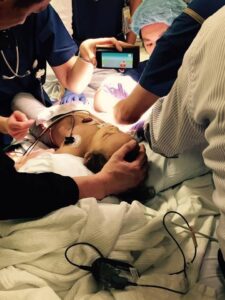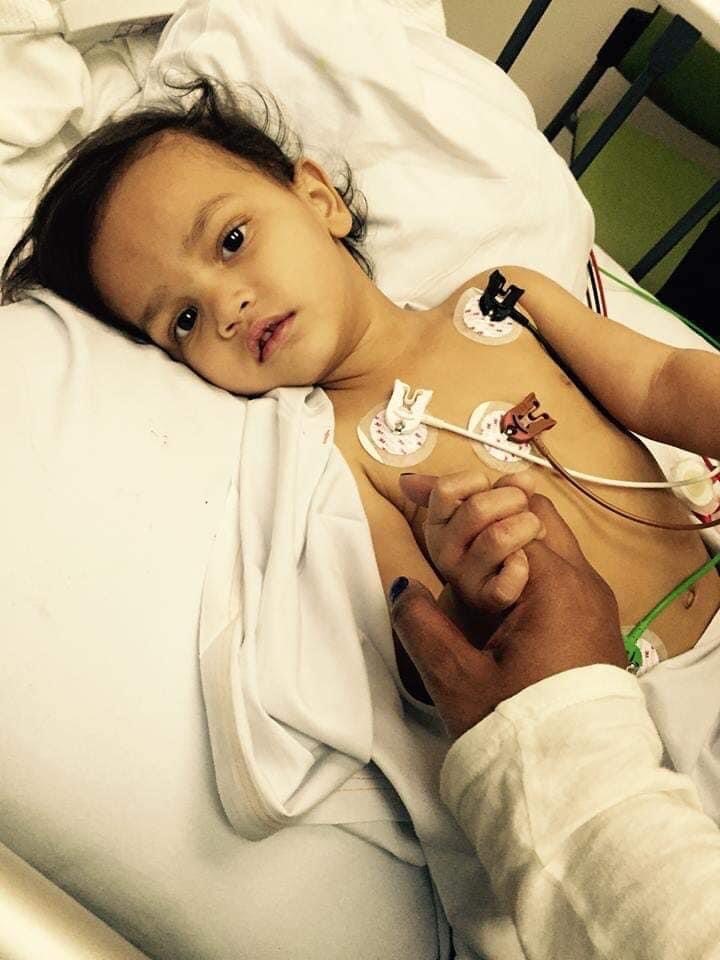Kaya
A Meningitis Story
Place of Residence: Melbourne, Victoria, Australia
Kaya was a healthy baby until she caught meningitis in April 2015, leading her to spend nine days in the hospital. Kaya was fortunate to survive, leaving her family with a delicate respect for human life.
Kaya’s mother, Candice, shares the story of how her 18-month-old daughter was infected with meningococcal B meningitis.
How would you describe Kaya?
Kaya is a creative, imaginative, quirky, and empathetic child. She is obsessed with roller skating and loves to write scary stories. Kaya is a kind old soul, who thinks deeply about others. One day she hopes to become a teacher, and I smile thinking about how these traits will make her beloved by her students.
How did Kaya become sick?
It was the 18th of April 2015, and Kaya was almost a year and a half. She started showing signs of illness, refusing to eat or drink, and developed a fever. We called a “Nurse on Call” and described her condition. They suggested her symptoms might be related to a gastrointestinal issue, and we trusted their judgment and didn’t want to overreact.

How did Kaya’s illness progress?
Around midnight my motherly instincts were urging me to take Kaya to the emergency room. I couldn’t explain it, but something just didn’t feel right. I phoned the on-call nurse again and after some persuasion, we decided not to go, although the “what if” haunted me for a long time. We followed the advice we were given by the nurse, cooling Kaya in a bath to bring down the fever, which worked temporarily. The next morning, Kaya drank a full bottle, and we hoped she was on the mend. She wasn’t interested in walking or crawling, although we assumed that was just part of her recovery.
At what point did you realize it was serious?
On the morning of April 20th, I woke up, looked at Kaya, and rushed her straight to our local doctor’s office. The doctor, calm and perceptive, took one look at her and urgently sent us to the nearest emergency room. Kaya’s guttural wails of pain had become a constant dirge, a heartbreaking sound that signaled something was terribly wrong. In the emergency room, a pediatrician examined her. He asked her to walk, and although she resisted, her zombie-like movements confirmed his suspicions. Something was seriously wrong. The urgency in the room escalated, and they started treating her for meningitis without waiting for tests.

Time was crucial as each minute seemed to matter when it came to meningitis. They struggled to find a vein for the intravenous antibiotics, eventually locating one in her foot. Nurses played the Wiggles TV show to distract her from the needle. We found ourselves in a makeshift intensive care unit (ICU), having taken her to the closest hospital, unaware that a children’s ICU was necessary. They assigned a nurse to be with her 24/7 until she stabilized. We were there, but we felt like ghosts unable to fully absorb the gravity of the situation.
Kaya underwent a lumbar puncture, a painful procedure that required two men and her father to hold her down while they inserted a needle into her spine to withdraw fluid—the only way to confirm meningitis. She came out of that test with tiny self-inflicted cuts on her forehead, a testament to her fierce resistance. Tests confirmed she had meningococcal B meningitis. They administered various antibiotics throughout the night; it was all a blur.
The following day, the doctor casually mentioned that it seemed Kaya would make it, which made me realize I hadn’t even considered the possibility that she might not. Meningococcal meningitis was far more serious than I had ever imagined. I began researching, but the information I found was overwhelmingly bleak and I quickly stopped.
Time was crucial as each minute seemed to matter when it came to meningitis.
How long was Kaya hospitalized?
Kaya was in the hospital for nine days. She was too weak to sit or stand and so was mainly confined to her bed.
Was Kaya vaccinated for meningitis?
At the time, Kaya was vaccinated with all the required immunizations for her age. In Australia, the meningococcal B vaccine is free for specific populations as part of the National Immunisation Program. MenB vaccination is recommended for all infants and children less than two years old, but it’s an optional vaccine that families can purchase. I wish I had known. It would have saved her hearing and her ability to communicate without medical intervention.
What long-term medical complications have resulted from Kaya’s meningococcal disease?
Kaya lost most of her hearing in her right ear and a significant amount in her left. She has been implanted with cochlear implants in both ears and had to have years of therapy to regain lost speech, which she continues to this day.

Missed signs, incorrect diagnoses, and/or slow-acting doctors could be the difference between life and death. Vaccination against this deadly disease is the only way to ensure the protection of your loved ones.
What do you want others to know about meningitis? What should they take away from your family’s story?
Timely emergency medical assistance is crucial when it comes to meningitis. Missed signs, incorrect diagnoses, and/or slow-acting doctors could be the difference between life and death. Vaccination against this deadly disease is the only way to ensure the protection of your loved ones.
Our experience with meningitis devastated our family in many ways, but it also gave us all a delicate respect for human life. It showed us that through resilience, research, and perseverance, you can literally love someone back to a brand-new life. It also made each of us tender, present, and grateful.
Candice shares her daughter’s story as a way to help educate others and hopefully prevent other families from having a similar experience.
BECOME A VACCINE ADVOCATE
There are lots of ways you can make a difference in your community.


